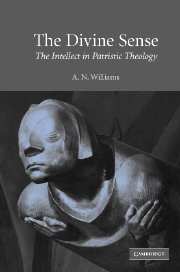Book contents
Chapter 1 - The dawn of Christian theology
Published online by Cambridge University Press: 22 September 2009
Summary
Christian theology begins, not with a school of academic theologians, but with the writings of a group of authors who knew they might end their lives as martyrs and who in several cases did. Under the circumstances, one would scarcely expect a fully developed systematic theology, much less a sustained reflection on the life of the mind. Yet to a surprising degree, we find the same themes in the earliest Christian theology that we find in the sophisticated reflection of later ages. These themes are less fully worked out, yet their sheer occurrence in these earliest texts is a signifier of the centrality of the mind in patristic theology. Because we are dealing with a group of writers separated both geographically, and chronologically by as much as the span of a century, we will treat them individually rather than synthetically. Even so, a clear pattern emerges, in virtue of which the mind begins as a present theme and gradually grows in importance.
THE APOSTOLIC FATHERS
We have certain knowledge regarding the authorship of only two of the writings traditionally grouped together under the label ‘Apostolic’: those of Ignatius of Antioch and Polycarp of Smyrna. Moreover, what writings are included under the rubric ‘the Apostolic Fathers’ has differed, and the label itself is fairly recent.
- Type
- Chapter
- Information
- The Divine SenseThe Intellect in Patristic Theology, pp. 21 - 43Publisher: Cambridge University PressPrint publication year: 2007

